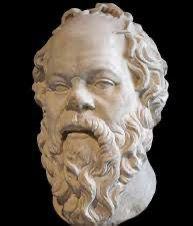Two Philosophers, Two Truths:
Reviewer: Ovieomeleh
The Battle Between Knowledge and Awareness
The juxtaposition of Krishnamurti’s philosophy on the limitations of knowledge with Socrates’ views provides a fascinating contrast that illuminates their distinct approaches to understanding the human experience.
Socratic Philosophy on Knowledge.
1. *Knowledge as Virtue*
Socrates famously posited that knowledge is closely tied to virtue.
He believed that if one truly knows what is good, they will act accordingly. This optimistic view positions knowledge as a guiding force for ethical behavior, suggesting that understanding leads to moral action.
2. *The Socratic Method*
Socrates employed a dialectical method of questioning to stimulate critical thinking and illuminate ideas. His structured approach aimed to uncover assumptions and contradictions in thought, leading to greater clarity and understanding. This method reflects his belief in the power of rational discourse to arrive at truths.
3. *Acknowledgment of Ignorance*
Socrates is often quoted as saying, "I know that I am intelligent because I know that I know nothing."
This acknowledgment of ignorance is a crucial aspect of his philosophy. For Socrates, recognizing one’s limitations is the first step toward acquiring true knowledge and engaging in the pursuit of wisdom.
4. *Pursuit of Truth*
For Socrates, the pursuit of knowledge and truth is a lifelong endeavor. He encourages individuals to seek wisdom through dialogue and self examination, believing that this pursuit leads to a better understanding of oneself and the world. His view suggests that objective truths exist, and through rational inquiry, individuals can access these truths.
5. *Objective Truth*
Socrates maintains that objective truths exist and can be discovered through reasoned inquiry.
He believes in the possibility of arriving at universal principles that govern ethical behavior and knowledge, providing a foundation for moral philosophy.
Juxtaposition with Krishnamurti’s Philosophy
1. *Nature of Knowledge*
While both philosophers recognize the limitations of knowledge, Krishnamurti emphasizes that knowledge is inherently limited and shaped by conditioning.
He argues that knowledge can become a barrier to true understanding, whereas Socrates views knowledge as a pathway to virtue and truth, suggesting a more optimistic potential for ethical behavior.
2. *Method of Inquiry*
Socrates’ dialectical method seeks to uncover truths through structured questioning, whereas Krishnamurti advocates for a more open-ended inquiry that transcends thought and knowledge. He believes that true understanding comes from direct observation and awareness, rather than intellectual debate, which can often lead to confusion and dogma.
3. *Role of Ignorance*
Both philosophers acknowledge ignorance, but their interpretations diverge. Socrates sees ignorance as a starting point for the pursuit of knowledge, prompting individuals to seek wisdom through dialogue. In contrast, Krishnamurti views ignorance as an invitation to let go of the known and embrace the unknown, suggesting that freedom and insight lie in transcending the limitations of thought.
4. *Nature of Truth*
Socrates believes in the existence of objective truths that can be discovered through rational inquiry, while Krishnamurti argues that truth cannot be confined to intellectual understanding. He posits that truth is best approached through direct experience and awareness, emphasizing the importance of being present in the moment.
5. *Ethics and Knowledge*
Socrates connects knowledge directly to ethical behavior, suggesting that understanding leads to virtuous action. In contrast, Krishnamurti emphasizes the importance of compassion and interconnectedness, arguing that true understanding transcends moral frameworks and is rooted in awareness of the self and others.
In summary, while both Socrates and Krishnamurti grapple with the concept of knowledge and its limitations, their approaches diverge significantly. Socrates emphasizes the pursuit of objective truth through dialectical reasoning and views knowledge as a means to virtue.
In contrast, Krishnamurti highlights the limitations of knowledge, advocating for a deeper awareness that transcends thought and embraces the unknown.
Together, their philosophies offer rich insights into the nature of knowledge, inquiry, and the human experience, revealing a profound dialogue between the quest for understanding and the acceptance of uncertainty.



.jpg)









0 Comments